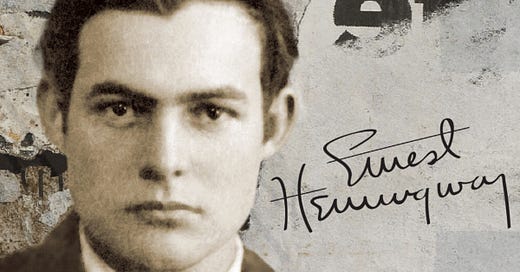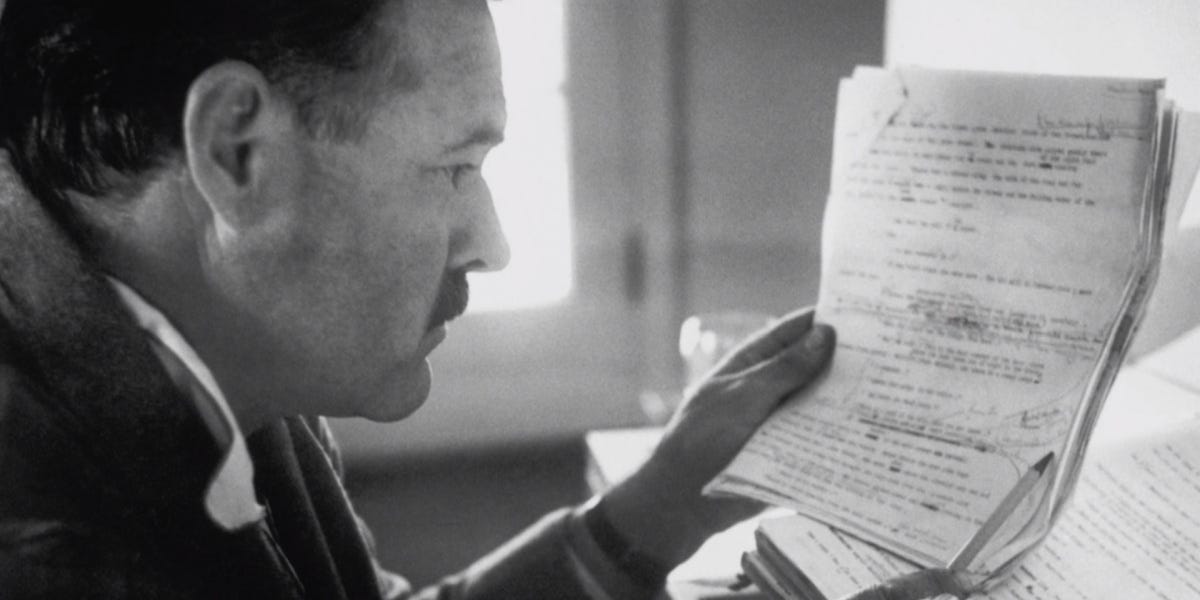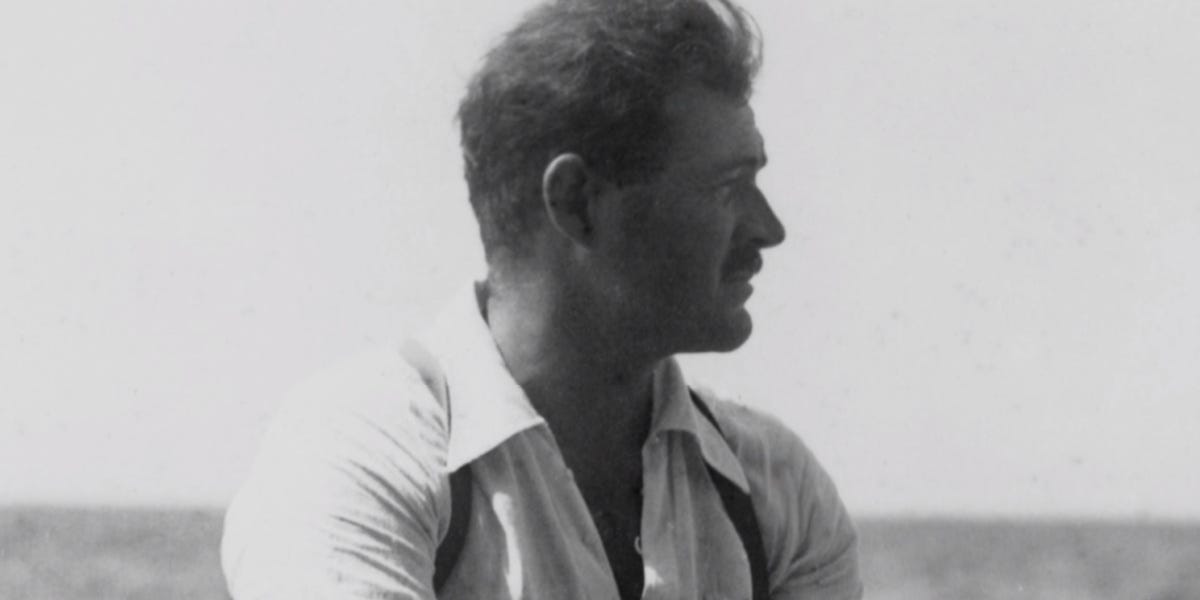Hemingway On Writing Good Dialogue
Nevermind that he's been gone for half a century, if you struggle to write strong and compelling dialogue, this might be why.
Here’s a little story I love. When Hemingway was typing Old Man And The Sea, his wife Mary was grabbing pages as they came off the typewriter. After reading several, she looked at him and said “I forgive you for all the rotten things you've said.”
I love that so much. What finer compliment is there, really?
And rightly so. That book won him the 1953 Pulitzer and it was the only book named when he won the 1954 Nobel Prize for literature.
Everyone talks about how macho he was. A hunter, a fighter, a man’s man and all that stuff. And it was absolutely true. But who of us is so singular that one description is enough? The man had a wicked keen eye. He saw. People. How they behave.
Here. Let me show you.
In For Whom The Bell Tolls, Pablo’s woman has just taken over his band of guerrillas. Pablo is a proud man who rose up against fascists and led a glorious revolution. But he’s become afraid of death. So his woman, Pilar, took over. Look at this…
So I said, ‘You understand now that I command?’
‘Yes, Pilar. Yes,’ he said. Later in the night I hear him awake and he is crying. He is crying in a short and ugly manner as a man cries when it is as though there is an animal inside that is shaking him.
Who describes a man crying that way? Only Hemingway.
Sometimes, I hear people grumble that Papa is overrated. Sour grapes, no doubt, because they were forced to read his books in school. But listen. This one man changed how writers write in America. Maybe the world.
Before him, novels were flowery affairs, describing everything in exhaustive detail and a chore for the reader to wade through. Yesterday’s purple prose. As Hemingway’s star rose, you see his influence. The shift from long flowing prose to simple language in popular novels is so obvious you can’t help but see it once you know to look.
It’s why he won the Nobel Prize for literature. The art of his narrative.
He had an interesting take on dialogue I think a lot of writers today could learn from. He said good dialogue is not real speech-it's the illusion of real speech.
You can see that in A Farewell To Arms, published in 1929.
“Maybe...you'll fall in love with me all over again."
"Hell," I said, "I love you enough now. What do you want to do? Ruin me?"
"Yes. I want to ruin you."
"Good," I said. "That's what I want too.”
—A Farewell To Arms, Ernest Hemingway
We both know that’s not how the conversation would go if a woman said to her man “maybe you’ll fall in love with me again.”
People spill too many words. All the time. A tsunami of words.
You read that, and you feel everything that you need to feel without wading through more words than are necessary. The illusion of real speech.
I ran across a fascinating conversation with him. Esquire, I think, but I could be wrong. He said when he’s writing prose, he prefers a pencil. But when writing dialogue, he moves to the typewriter. Because people talk like typewriters.
He said he likes to use the iceberg theory, in writing. Only 10% of the story needs to be on paper. The rest should be alluded to. The reader will get it.
And they did indeed. A Farewell To Arms was his first bestseller. It sold 45,000 copies in the first three months and over 100,000 copies the first year. The text is beautiful. Written in plain and simple language.
"I had not wanted to fall in love with any one. But God knows I had and I lay on the bed in the room of the hospital in Milan and all sorts of things went through my head but I felt wonderful. —A Farewell To Arms, Ernest Hemingway
Anyone who has ever fallen in love when they weren’t planning to can understand that. Didn’t plan this. It’s wonderful. He doesn’t need an excess of words.
A Farewell To Arms was is the story of an American lieutenant, Frederic Henry who falls in love with Catherine, an English nurse. The dialogue is absolutely lovely. In this example, Catherine is asking Frederic about people he loved before her.
“Tell me. How many people have you ever loved?”
“Nobody.”
“Not even me?”
“Yes, you.”
“How many others really?”
“None.”
“How many have you—how do you say it?—stayed with?”
“None.”
“You’re lying to me.”
“Yes.”
“It’s all right. Keep right on lying to me. That’s what I want you to do. Were they pretty?”
Again — give this scene to twenty writers. Tell them, a woman asks a man how many other women he loved before her. This is not how they would write it.
Here’s one more. Also from A Farewell To Arms.
“Your brigade?”
He told them.
“Regiment?”
He told them.
“Why are you not with your regiment?”
He told them.
“Do you know that an officer should be with his troops?”
He did.
You know how most people would write that, yes? They’d answer all the questions in detail, not realizing the answers belong under the water, not above it.
I’ve read a lot of bad dialogue. I think we all have. People write dialogue the way we actually speak. Boring. Too long. Most of the iceberg is above the water. Doesn’t matter if you write novels or essays, his take on dialogue is worth remembering.
“Good dialogue is not real speech-it’s the illusion of real speech.”
— Ernest Hemingway






I have never read Hemingway. And always wanted to. Don't judge.
Thanks for this article, Linda!
Thought provoking.